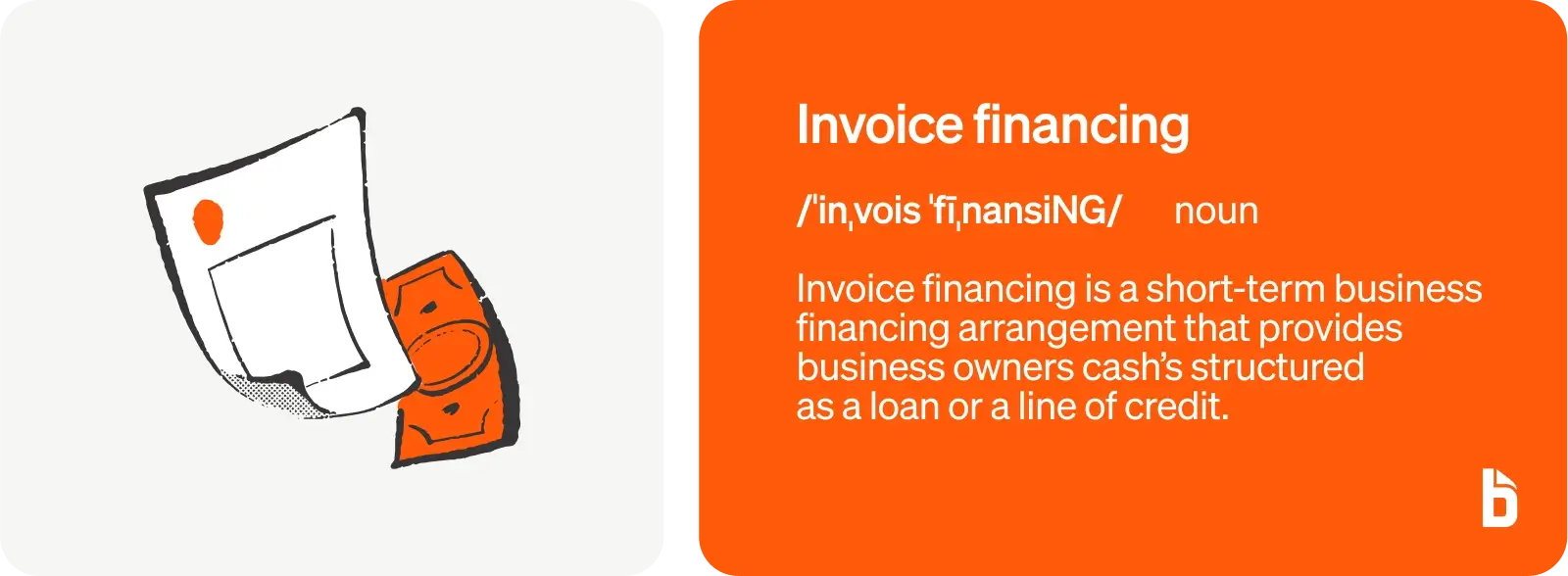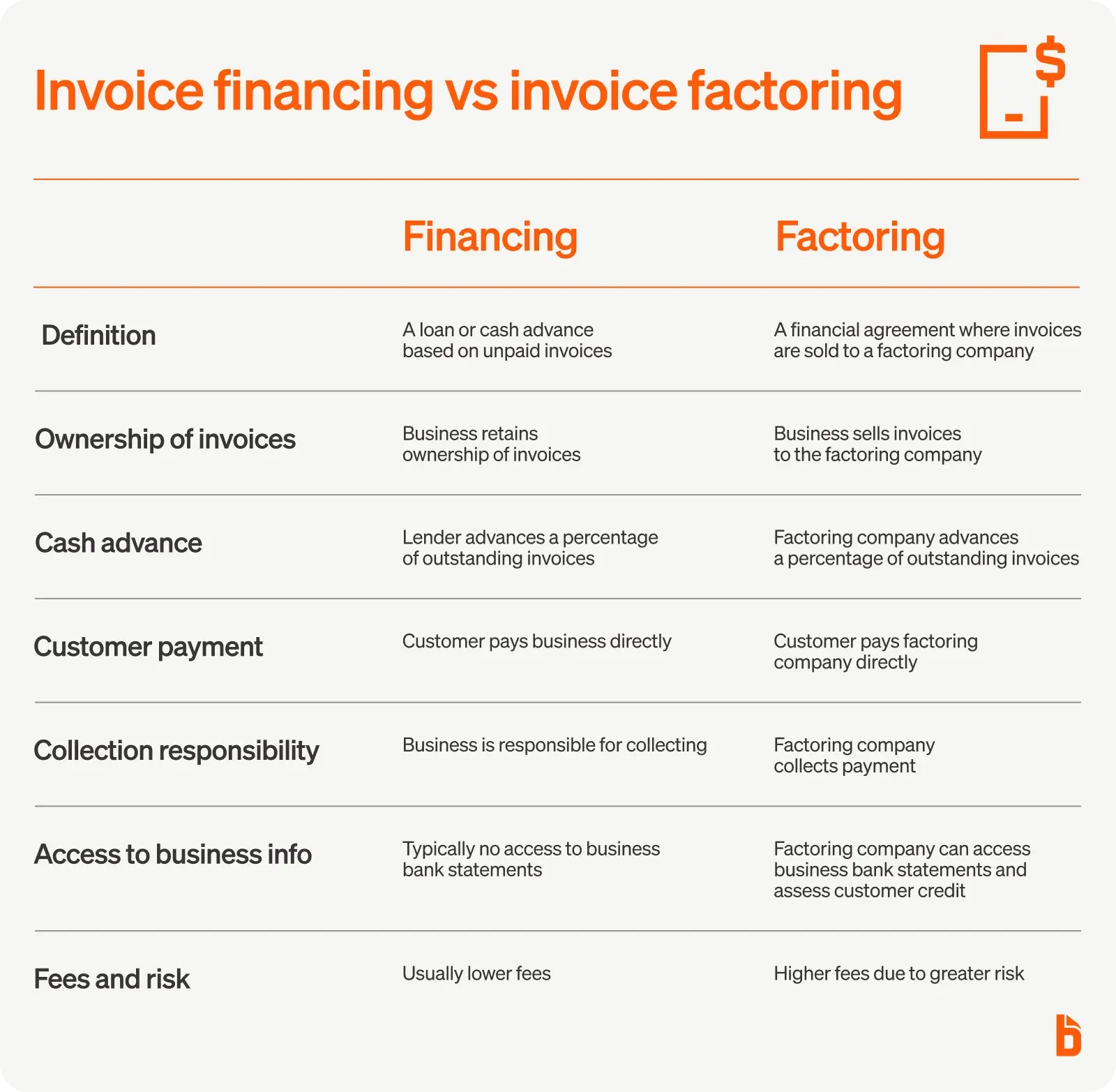If you've ever relied on a customer's invoice to get you through your business costs, then there's good news: With invoice financing, you can turn unpaid invoices into a cash-flow machine, so you have the funds you need for your business.
Let's dive into what you need to know about invoice financing, including what it is, why you might use it, and its advantages and drawbacks.

What is invoice financing?
Invoice financing is a short-term business financing arrangement that provides business owners cash that's structured as a loan or a line of credit.
When you're accepted, the invoice financing company uses your outstanding invoices as collateral, which is why it's also called accounts receivable financing.
Invoice financing is like getting an advance for your unpaid customer invoices.
Businesses rely on accounts receivable financing to access cash quickly while waiting for clients and customers to pay their unpaid invoices.
This cash gives the company enough working capital, whether they need to manage payroll, buy inventory, pay vendors, or pay a bill.
Benefits of invoice financing
The advantages of invoice financing include:
- You can lessen cash flow issues. Knowing this financing option is available lets your business take advantage of opportunities you couldn't otherwise afford.
- Receive fast funding with ease. Unlike other types of financing, like a term loan, you'll get the money quickly with invoice financing. There's less paperwork and less waiting.
- It's easy to qualify for invoice financing. Because you're using invoices as collateral, even small businesses with bad credit can qualify.
Invoice financing vs. “traditional” lending options
Outside of invoice financing, two popular lending options small businesses turn to are standard loans and credit cards.
However, invoice financing can be a better option for many small businesses in need of short term financing.
When compared to a traditional loan, invoice financing often is an easier process (as we’ll explore later). Traditional loans can require you to jump through multiple hoops to get approved, particularly if the loan is unsecured.
Credit cards are another popular option for short term financing. While they may be helpful in certain situations, they often come with interest rates of 20% or more. Invoice financing costs a fraction of that amount.
Lastly, some smaller businesses that don’t have access to traditional financing may turn to other alternative short term lenders out of desperation.
Unfortunately, these options can be predatory (e.g. lenders that charge triple digit interest) and put your business into a financial hole that’s difficult to climb out of.
When you’re weighing your options, consider invoice financing as a more affordable and sometimes faster alternative.

Invoice financing vs. invoice factoring
Invoice financing and invoice factoring let you use unpaid invoices to generate quick cash, making them useful if your working capital is low as you wait for more money.
But, invoice financing and invoice factoring are different.
For starters, invoice factoring isn't a loan. It's a financial agreement that businesses make with invoice factoring companies.
Like invoice financing, lenders give you a cash advance worth a percentage of your outstanding invoices. The difference is when your customer pays, the invoice factoring company forwards your remaining balance minus their fees.
Instead of maintaining ownership, your business sells your customer invoices to the lending company.
In turn, the invoice factoring company has access to your business bank statements, can assess your customers' credit history, is responsible for collecting payment from your customers, and may charge higher fees since there's a more significant risk.
How does invoice financing work?
Invoice financing services can save your business in a pinch because you can access working capital quickly.
An invoice financing company advances you a percentage of the invoice value in exchange for a small fee. You still own the invoice and have to collect payment for it, but you'll receive the money you need in the meantime.
Here's how invoice financing works:
- Your business sends your client an invoice for your products or services. The invoice has a set due date of 30 days or more, so you don't expect to receive the amount owed for weeks.
- You realize you need cash immediately to fund your operations, so contact an invoice financing company and request an invoice loan.
- Your lender advances you a percentage of the invoice, usually between 70% and 85% or more. With invoice financing through BILL, you may receive up to 97% of the invoice total.
- Your client pays the invoice by the 30-day due date, and you pay back the lender for the loan plus any agreed-upon fees (origination fees, interest fees, etc.).
Invoice financing structure
Invoice financing arrangements have similarities to short-term loans. In their simplest form, arrangements can be based on a single invoice.
Using that invoice as collateral, the financial company operating as the lender would advance cash to the business.
Invoice financing example
Let's look at a real-life example of when a small business owner might use invoice financing.
Kay's Catering hosted a corporate event for their client, Mega Software Solutions, and sent an invoice for $20,000 with a 30-day payment term.
The next day, another client reaches out and wants Kay's Catering to cater a birthday party at the last minute.
But until Mega Software Solutions pays their invoice, Kay's Catering needs more cash to hire extra cooks and servers required for that event.
Instead of applying for a loan or charging more to the business card, Kay's Catering turns to an invoice financing company.
The invoice financing company agrees to lend Kay's Catering 80% of the $20,000 invoice they're waiting on with a 4% interest fee for every 30 days the loan is unpaid.
This gives Kay's Catering $16,000 as a lump sum, allowing the business owners to pay for the food supplies, labor, and cooking equipment they need for the birthday party.
After catering the birthday party, Mega Software Solutions pays its $20,000 invoice.
Then Kay's Catering successfully pays back the invoice financing company the $16,000 advance and $800 invoice financing and processing fee.
In the end, Kay's Catering kept 96% of its original invoice amount ($19,200).
How to qualify for invoice financing
Qualifying for invoice financing varies depending on the lender.
However, here are some common factors that businesses should consider when seeking to qualify for invoice financing:
Note: When exploring lending options, it’s important to understand what factors the lender you’re applying to considers. For instance, with BILL’s invoice financing, many of these “traditional” qualifying metrics bear less weight since your ability to repay is tied to your invoice history. As a result, the qualification process may be easier.
- Creditworthiness: The creditworthiness of your business and your customers is crucial. Lenders often assess your credit history and the creditworthiness of the companies that owe you money (your customers). They want to ensure that your customers are likely to pay their invoices.
- Business financials: Lenders may review your business's financial statements, including balance sheets, income statements, and cash flow statements, to assess your financial stability and ability to repay the financing.
- Invoice quality: The quality of your accounts receivable is vital. Lenders may prefer invoices due from creditworthy customers and free from disputes or legal issues.
- Invoice volume: Lenders typically have minimum and maximum invoice volume requirements. Your business should generate sufficient invoices to make invoice financing worthwhile for both parties.
- Business history: Some lenders may require that your business has been in operation for a minimum period, often around one to two years, to demonstrate stability and reliability.
- Customer concentration: Lenders could see it as a risk if a significant part of your revenue
- comes from a single or a few customers. Diversified customer bases are often preferred.
- Debt Obligations: lenders may assess your existing debt obligations, as excessive debt could affect your ability to repay the financing.
- Industry and Location: Your industry and geographic location can also influence your eligibility for invoice financing, as some lenders may have preferences or restrictions in these areas.
- Personal guarantees: Sometimes, lenders may require personal guarantees from business owners or principals to secure financing.
- Clean financial history: Lenders typically prefer businesses with a clean financial history, including no recent bankruptcies, liens, or judgments.
How to apply for invoice financing
Applying for invoice financing involves a series of steps to provide information about your business and the accounts receivable you wish to finance. Here's a general guide on how to apply for invoice financing:
1. Determine your needs
Identify the specific invoices you want to finance and the financing you require. Determine your immediate cash flow needs and how invoice financing can help.
2. Choose a financing provider
Research and select a reputable invoice financing provider that suits your business needs. Consider factors like interest rates, fees, terms, and customer reviews when choosing.
If you use an accounts receivable solution, they may offer invoice financing as well. (Hint: BILL does!)
3. Apply
Complete the formal application provided by the financing provider. This application will require detailed information about your business, including but not limited to:
- Financial statements
- Tax returns
- Invoice information
4. Monitor customer payments
As your customers pay their invoices, the financing provider will deduct their fees and the advanced amount. The remaining funds are then remitted to your business.
Continue managing your accounts receivable and working with the financing provider to ensure a smooth process for all parties involved.
Remember that the specific application process may vary depending on your chosen financing provider.
Be prepared to provide detailed documentation about your business and accounts receivable, and communicate openly with the financing provider to address any questions or concerns.
Invoice financing for small businesses with BILL
At BILL, we’ve streamlined the invoice financing process for small businesses. With BILL, you can:
- Apply quickly using your existing BILL account information
- Typically receive funds within 1-2 business days (potentially faster for eligible businesses)
- Receive up to 97% of your unpaid invoice amount (up to $100,000)
- Avoid interest or additional fees if the invoice or advance is repaid within two months
To learn more about our invoice financing options, click here.
FAQ
Is invoice financing a good idea?
Invoice financing offers benefits but requires careful consideration.
Typically, it's helpful for businesses facing cash flow challenges due to delayed customer payments. It leverages unpaid invoices to provide immediate working capital, bridging financial gaps.
With invoice financing, your creditworthiness matters less, which makes it more accessible for newer businesses.
However, some factors merit your attention before choosing this option.
First, assess your customer relationships. Second, consider the cost, since invoice financing comes with fees.
Also, legal and regulatory aspects can vary by location, so be informed. Choose a reputable provider with transparent practices.
Is invoice financing easy to get?
Typically, invoice financing is easier to obtain than a traditional bank loan or line of credit.
The key factor that makes it accessible is that it relies mainly on customer creditworthiness instead of your business's financial history.
This means that even if your business is relatively new or lacks an extensive credit history, you may still be eligible for invoice financing.
The application process for invoice financing is typically less cumbersome and time-consuming than traditional lending options.
Invoice financing rates can vary significantly depending on the provider, your business's risk profile, and the terms of the agreement. Typically, providers charge fees based on the total invoice value or a percentage of the amount financed.
These fees can range from 1% to 6% or more.
Increase your chances of securing invoice financing. Working with reputable financing providers, maintain clear and organized financial records, and have a solid understanding of the terms and costs associated with the financing arrangement.


